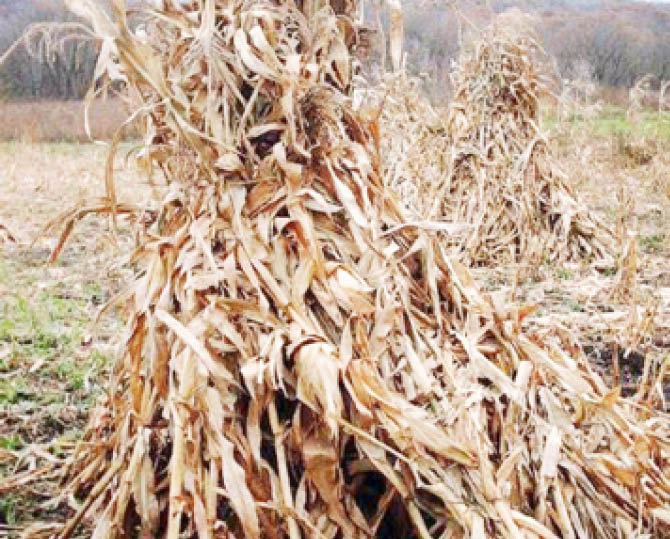‘Nigeria can revive paper industry from agricultural residues’
Stakeholders in the paper industry are of the opinion that the major option available to countries with substantial agricultural produce is the production of papers from agricultural residues. Experts believe some of the agricultural residues that are sustainably available in Nigeria are being used in many countries to produce paper of different types. Among […]

Maize stalk is one of the agriculture residues that can be to produce papers
Stakeholders in the paper industry are of the opinion that the major option available to countries with substantial agricultural produce is the production of papers from agricultural residues.
Experts believe some of the agricultural residues that are sustainably available in Nigeria are being used in many countries to produce paper of different types.
Among these, according to a pulp and paper expert, Dr. Abimbola ogunwusi, are sugarcane, corn and cotton stalks which are used as alternative sources of fiber for paper manufacture. Others, he said, include sorghum stalk, cotton linters and cotton rags which is among the finest fibers accessible for papermaking. In most cases, the agricultural-residues are locally available for free or at a very low cost.
In a number of countries that do not have sustainable quantities of wood, most of them use non wood fibrous resources for production of different types of paper products. For instance, the use of agricultural residues and waste paper as the raw material base eased paper scarcity in India until the economic reform of 1991. Today, the major raw materials for paper production in India are wood, agro residues and waste paper.
In Nigeria, various studies have indicated massive availability of different fibre resources including recycled fibre, which may help in transforming the paper industry landscape if adequate investments can be made in utilizing them for paper production
Apart from fibre, a document from the Raw Material Research Development Council indicates that Nigeria has a number of non-wood raw materials. These are specialty non-woods or softwood replacements such as cotton linters, kenaf, bamboo as well as common non woods or hardwood alternatives such as straws, bagasse, corn stalks, sorghum stalks among others.
The document shows that Kenaf has been used as a substitute for wood pulp and paper production in Thailand and China.
According to Professor Hussaini D. Ibrahim, the Director-General of the Council, even though the pulping of non-wood fibres and agricultural residues has some challenges, assiduous research and development are obviating some of these problems. For instance, bamboo has relatively high ash and silicon problems compared with wood materials. This negatively impact on the recovery process for alkaline spent liquor and quality of some high-grade pulp products such as dissolving pulp. New technologies such as silicon removing/silicon retention have been developed to overcome the disadvantages of bamboo as pulping raw material as well as improve quality of bamboo pulp products.
According to the DG, Kenaf cooked with kraft, soda, or neutral sulfite processes produce better quality pulp than hardwood pulp. Mixed with different percentages of hardwoods, it is used to make printing and writing paper, newsprint, linerboard, tissue, bleached paperboard, cigarette paper and other light weight specialty papers.
FG’s efforts to develop agricultural residues
Professor Hussaini said the Raw Materials Research and Development Council has collaborated with the Institute of Agricultural Research and Training (IAR&T) Ibadan to produce kenaf foundation seeds which was multiplied by the Kenaf Association of Nigeria (KEAN) in Kwara State. This collaboration with IAR&T later led to the production of four varieties of kenaf breeder seeds for further multiplication by the association. RMRDC has also carried out a technical study on commercial scale pulping of bast kenaf fibres for long fibre pulp production. The report is available for use, study or consultations by investors.
In addition, he said five species of bamboo are indigenous to Nigeria, adding that bamboo is also popular as raw material for pulp and paper making in China, India and Malaysia. He said the council constituted a team made up of experts from UI, FUTA to carry out a nationwide survey of bamboo availability and utilization in Nigeria. The study indicated that bamboo is widely distributed, especially in the south and middle belt regions. He said the council is presently collaborating with a number of investors, especially Gamla Nigeria Limited, to establish bamboo plantation in Delta State.
According to him, to encourage development of non-wood small scale pulp and paper making industries in Nigeria, there is need to earmark certain products exclusively in the domain of the small-scale paper industries to protect them from competition from the large-scale mills that have been privatized. Also imperative is the improvement of access to credit, technology, skill and market information. Establishment of mills that will pulp the fibrous raw materials that are locally available will save Nigeria more than N500bn annually in foreign exchange equivalents.
